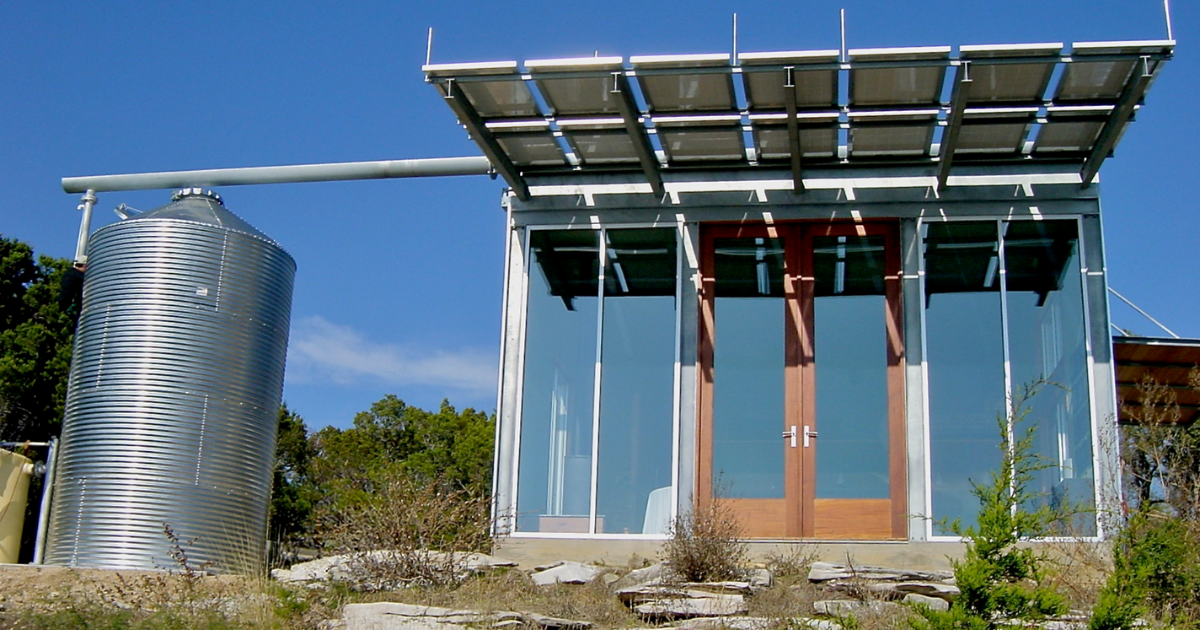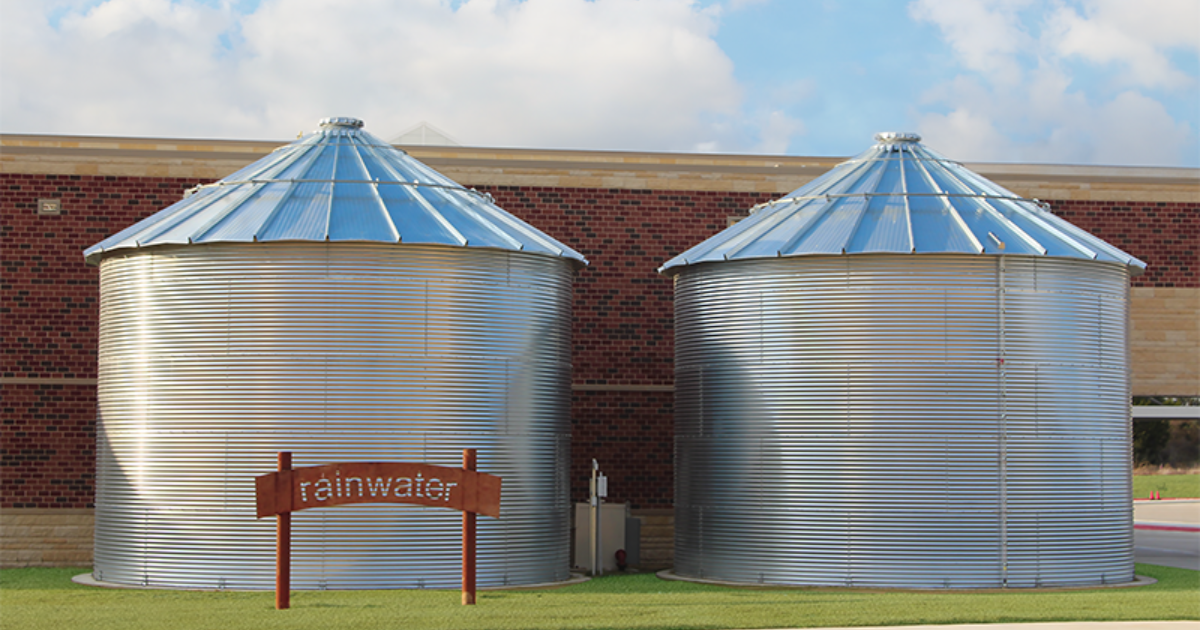AUTHORS: Josh Cizek & Brittany Driscoll
Share this article
As water conservation becomes more pressing and popular, individuals and businesses increasingly embrace self-sustainable practices like rainwater harvesting. This eco-friendly method of collecting and storing rainwater is not only beneficial for the environment but also for meeting various water needs, such as irrigation, livestock, and even household consumption. However, many people ask, “Is rainwater harvesting illegal?” The answer varies by state, city, and even neighborhood. In this article, we’ll explore the legality of rainwater harvesting, highlighting where it’s restricted and explaining why those restrictions exist. We’ll also guide you through state regulations.
What is Rainwater Harvesting?
Rainwater harvesting involves collecting and storing rainwater, typically from rooftops, into tanks or reservoirs for future use. This stored water can be utilized for various purposes, including watering plants, irrigation, watering livestock, keeping pond levels stable, flushing toilets, and even drinking water if appropriately treated. Many systems collect water from rooftops, directing it into a tank or cistern next to a home or other large structures where it’s stored for later use.
The question of legality arises because, while this practice has obvious benefits, there are regulations in some states that either restrict or regulate rainwater collection. These laws are often based on water rights and concerns over how rainwater collection might impact the local watershed.
Federal vs. State Regulations on Rainwater Harvesting
The federal government does not regulate rainwater harvesting. This leaves the responsibility of managing rainwater collection to state and local governments, which results in a patchwork of laws across the country. Some states actively encourage rainwater harvesting, while others impose restrictions. In some areas, even HOAs or neighborhoods might limit the installation of rainwater collection systems.
States Where Rainwater Harvesting Is Encouraged
Several states actively support rainwater collection, providing tax incentives, rebates, or even statewide regulations promoting the practice. We explore the rules for just a few states, but acknowledge that many other states encourage the practice:
Texas Rainwater Collection Rules
Texas has become a leader in rainwater harvesting in a state with frequent water shortages. The Texas Water Development Board encourages municipalities to adopt ordinances supporting the practice. At the state level, legislation has been passed to make the purchase of rainwater harvesting materials sales-tax free. The state also prohibits the banning of rainwater harvesting by homeowner associations (HOAs) and requires designers of public buildings to consider rainwater harvesting in their plans. Additionally, many Texas cities offer rebates for installing rainwater harvesting systems. However, HOAs do have the ability to regulate rainwater harvesting systems within their neighborhood and set restrictions, so it’s important to check local rules on your city’s website or contact your HOA.
Arizona Rainwater Collection Rules
Arizona offers tax incentives for homeowners and businesses that install rainwater harvesting systems. The state promotes sustaining water resources, combating potential drought, and improving the local watershed by collecting rainwater from impervious surfaces.
California Rainwater Collection Rules
California has a history of consistent droughts and actively encourages rainwater harvesting. The Rainwater Capture Act of 2012 allows residents to install rainwater systems without permits, so long as the water is used for non-potable purposes.
Oregon Rainwater Collection Rules
Oregon dictates that residents can collect rainwater from impervious surfaces such as rooftops without needing a water rights permit. The state sees rainwater harvesting as an essential tool for sustainable water use.
Virginia Rainwater Collection Rules
Virginia’s 2001 Senate Bill 1416 grants an income tax credit to homeowners who install a rainwater collection system. Additionally, the Virginia Code 31.1-248.2 states that the Department of the State and the Department of Environmental Quality are to promote rainwater collection for water conservation, reducing strain on the local water supply, and decreasing freshwater consumption and waste. This state makes it clear that it strongly advocates rainwater harvesting.
States With Restrictions or Limitations on Rainwater Harvesting
While rainwater harvesting is encouraged in many places, some states restrict or regulate the practice based on concerns about water rights and the potential impact on local ecosystems:
Colorado Rainwater Restrictions
Known for its strict water laws, Colorado historically banned most rainwater harvesting. However, in 2016, legislation was passed allowing residents to collect up to 110 annual gallons of rainwater from their roofs for use on their property. Colorado’s complex water rights system ensures that rainwater is allocated to downstream users, which is why strict regulations remain.
Utah Rainwater Restrictions
Residents can harvest rainwater in Utah, but they must register their rainwater collection system with the state if it exceeds a specific size. Utah’s rainwater harvesting laws are designed to ensure that the water is adequately managed without affecting water holder rights.
Nevada Rainwater Restrictions
Rainwater collection in Nevada is primarily limited to those who hold water rights. The state views rainwater as part of the greater watershed, meaning that restrictions are in place to protect the broader water system as set forth by Assembly Bill AB138.
Other States That Have Limitations or Restrictions on Rainwater Collection
Arkansas, Georgia, Idaho, Illinois, and Ohio.
Why Do Some States Restrict Rainwater Harvesting?
The primary reason for restricting rainwater harvesting stems from water rights laws. In states like Colorado, where water is a precious commodity, these laws ensure that every drop of water is allocated to specific uses, including surface water that eventually flows into rivers, lakes, or reservoirs. Rainwater collection in these states can divert water from its intended destination, affecting downstream users and local ecosystems.
Similarly, states like Utah and Nevada restrict rainwater collection to protect the delicate balance of their water systems, ensuring that water remains available to those with legal rights to its use.
What You Need to Know Before Starting Your Rainwater Harvesting Project
If you’re considering rainwater harvesting, there are a few steps to take before starting your project:
- Research State and Local Laws: Each state has different rainwater harvesting regulations. Even if it’s allowed in your state, check your city’s or HOA’s rules to ensure compliance.
- Register Your System if Necessary: In some states, like Utah, you may need to register your rainwater collection system with state authorities.
- Consult ARCSA Guidelines: Following the American Rainwater Catchment Systems Association’s (ARCSA) guidelines for rainwater system engineering and installation ensures that your system is safe, compliant, and efficient.
- Work With Professionals: Installing a rainwater system can be complex, especially if you plan to use the water for drinking. Consulting experts in the field can help you set up a compliant and sustainable system.

Water Storage Tanks, Inc. and ARCSA: Leaders in Rainwater Harvesting
At Water Storage Tanks, Inc. and Specified Water Systems, LLC, we’ve long been champions of rainwater harvesting and are deeply involved in the industry. Our Vice President, Christy Langendoen, also serves as ARCSA’s Vice President, ensuring that Water Storage Tanks, Inc. remains at the forefront of rainwater harvesting innovation and best practices. Our partnership with ARCSA helps us stay on top of evolving rainwater harvesting laws and regulations, allowing us to guide homeowners and businesses with the most accurate, up-to-date information.
Our involvement with ARCSA also reinforces our commitment to sustainability and water conservation. We take pride in adhering to ARCSA’s high rainwater system design, installation, and safety standards, making us a trusted choice for those looking to implement rainwater harvesting systems on their next project.
Rainwater Harvesting Tanks from Water Storage Tanks, Inc.
If you’re interested in starting your rainwater collection journey, Water Storage Tanks, Inc. and our network of dealers offer a variety of solutions tailored to meet your needs. Whether you’re a homeowner looking to reduce water consumption or a business aiming to integrate sustainable practices, our rainwater harvesting systems are customizable, durable, and efficient.
- Custom Rainwater Harvesting Systems: We offer a range of customizable tanks that can be built to fit your specific project requirements. Whether for irrigation, livestock, or potable use, our tanks are designed to withstand the elements and provide long-term water storage solutions.
- Expert Guidance on Rainwater Collection Regulations: As rainwater harvesting laws vary by state and locality, our team of experts helps ensure that your system complies with all relevant regulations, saving you time and hassle.
- Sustainable Rainwater System Design: Our tanks are built with sustainability in mind, ensuring that your rainwater harvesting efforts are as eco-friendly as possible. With Christy Langendoen, ARCSA’s Vice President, we ensure all systems meet the latest industry standards.
Conclusion: Is Rainwater Harvesting Illegal?
In most states, rainwater harvesting is perfectly legal; in some, it’s even encouraged. However, some states have restrictions, primarily due to water rights and concerns about diverting water from natural systems. Understanding your state, city, and HOA laws is essential before installing a rainwater collection system.
At Water Storage Tanks, Inc., we’re proud to be at the forefront of rainwater harvesting, offering industry-leading solutions and guidance on best practices. Our involvement in ARCSA, commitment to sustainability, and emphasis on top-quality products make us the top choice for those looking to start a rainwater harvesting project. Visit our rainwater harvesting page to learn more, or contact us for a free consultation or quote.
Connect With Us on Social Media
Check Out Our Latest Posts
Explore Post Categories
- CorGal® Tanks (1)
- Fire Protection (2)
- Irrigation & Agriculture (1)
- News (1)
- NFPA 22 (2)
- Potable Water (2)
- Rainwater Harvesting (1)




